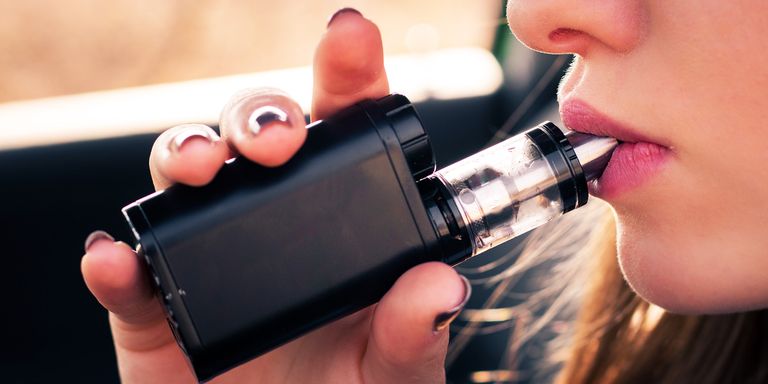Sorry, But Vaping Is Probably Bad For Your Heart

If you’re, oh, basically any e-cigarette smoker, you’re probably choosing to vape rather than smoke a cigarette because you think it’s better for you than something that contains tobacco and nicotine. But, yeah, about that…e-cigs may be bad for your heart, too—particularly if vape juice flavorings are involved. (Sorry, unicorn milk, beetle juice, and lemon twist fans.)
The news comes from a study published Thursday in the American Heart Association’s journal, Arteriosclerosis, Thrombosis, and Vascular Biology. In the study, researchers found that all of the vape juice flavorings tested can impair blood vessel function—an early indicator of heart damage.
Well, shit. Which vape juice flavors are dangerous?
Nine chemical flavorings were tested for their short-term effects on endothelial cells (a.k.a. the cells that line the blood vessels and inside of the heart), according to a statement from the American Heart Association.
After being exposed to the cells for just 90 minutes, all nine flavors—menthol (mint), acetylpyridine (burnt flavor), vanillin (vanilla), cinnamaldehyde (cinnamon), eugenol (clove), diacetyl (butter), dimethylpyrazine (strawberry), isoamyl acetate (banana) and eucalyptol (spicy cooling)—were dangerous to the epithelial cells and caused cell deathwhen used at the highest levels.

A few specific flavors—cinnamon, clove, strawberry, banana, and spicy cooling—caused cell death at lower levels, too. According to the study, strawberry flavoring had the most adverse effects on epithelial cells.
Each one of the nine vape flavors also impaired production of nitric oxide—a molecule that essentially lets blood vessels widen for blood to flow through them—when used at the highest levels. Burnt flavor, vanilla, cinnamon, and clove flavors in particular, however, caused higher levels of the inflammatory marker interleukin-6 and lower levels of nitric oxide, even when used at low levels.
“Increased inflammation and a loss of nitric oxide are some of the first changes to occur leading up to cardiovascular disease and events like heart attacks and stroke, so they are considered early predictors of heart disease,” lead study author Jessica L. Fetterman, Ph.D., said in a statement. “Our findings suggest that these flavoring additives may have serious health consequences.”
Anything else I need to know about this study?
Worth noting: This was a short-term study done on what basically amounts to human cells in a petri dish—so more research is needed to definitively prove that e-cigs are bad for your heart (previous science on long-term effects of eg-cigs is pretty much MIA).
Also, the high concentrations used during the study are “unlikely to be achieved” in the real world, according to the study. The low levels, however, are more likely to be close to an IRL scenario, per the American Heart Association.
But that doesn’t mean the findings are insignificant. And while some of the trendiest vape juice flavors—like unicorn milk, beetle juice, and lemon twist—weren’t specifically tested, that doesn’t mean they’re safe (especially since every single flavor researchers did test were associated with some level of risk).
So, IDK—maybe it’s time to stop thinking that using e-cigs is a healthy alternative to using other types of tobacco products. Because caveats and all, these findings are still pretty scary.
Source: Read Full Article


